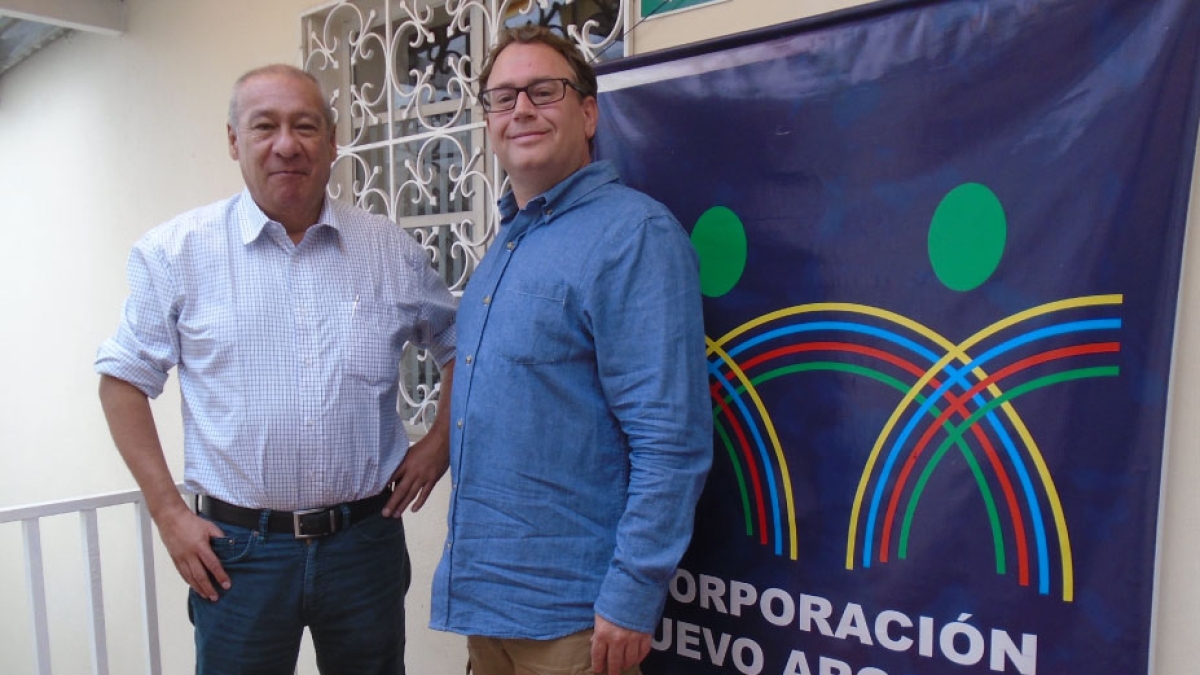ASU lecturer examines conflict and economic development in South America

ASU's Charles G. Ripley (right) meeting with Henry Cuervo Castillo, the human rights adviser for La Corporación Nuevo Arcos Iris.
ASU political science instructor Charles G. Ripley recently traveled to Ecuador and Colombia to speak with nongovernmental organizations and intergovernmental organizations while researching conflict and economics in the area.
Ripley’s research examines countries such as those in South America, which are addressing their own developmental and security concerns through South-South relations, which exclude the regional influence of the United States.
Drawing upon extensive fieldwork and academic research, this book examines how South American countries have been able to address their own developmental and security concerns. By excluding the influence of the United States, regional initiatives have opened crucial policy space for successful economic policies and conflict-resolution strategies that otherwise would not have been considered.
Now, back in Tempe, Ripley shares with us about his time abroad:
Question: What are South-South relations, and why are they important?
Answer: South-South relations have been on the rise, indicating a more diverse world in which countries can have relations. In a nutshell, these are relations between developing countries (say, from Latin America, Asia and Africa) instead of the conventional North-South, top-down arrangement. What makes South-South relations so interesting is that they do not fit neatly into the conventional international relations theory. Instead of integration, which much of the literature stresses, South-South relations open space for conflict-resolution strategies and economic policies that otherwise would never be considered.
Q: Why did you specifically choose to travel to Ecuador and Colombia for your research?
A: Since there is a scarcity of cases, fieldwork is a necessity to learn exactly what happens. In Colombia, the government engaged in South-South relations to end its half a century of civil war (1964-2016), the longest in Latin American history. Instead of relying on the United States, its traditional partner, conservative President Juan Manuel Santos (2010-present) surprisingly turned to Cuba to negotiate with the Revolutionary Armed Forces of Colombia—People's Army (FARC-EP). The unique relationship opened critical policy space for both sides to arduously hammer out agreements over a long five-year period, finally reaching peace agreements in 2016.
Ecuador was important since UNASUR (Union of South American Nations) is located in the capital Quito. UNASUR has been instrumental in addressing both intrastate and internal conflicts throughout South America. It resolved serious border disputes between Colombia and Venezuela (2008-2010), as well as deadly conflict within Bolivia (2008). I hope to travel to Bolivia and Nicaragua (though the latter is Central, not South America) to finish the book project.
Q: Whom did you speak with while in South America to help advance your research?
A: Both trips gave me unique access to policymakers and grass-roots organizations involved in South-South relations. In Colombia, for example, I worked with nongovernmental and governmental organizations such as la Corporación Nuevo Arco Iris and el Centro Nacional de Memoria Histórica. Through these trips, I received opportunities and information I never would have had without fieldwork.
Q: How do countries who focus on South-South relations differ in how they attempt to address their own developmental and security concerns?
A: South-South relations opens critical space for a wider range of policy options. More precisely for South America, they remove the United States, the hegemonic regional power, and world institutions like the International Monetary Fund (IMF) and World Bank, which all have powerful interests behind them. Often, these interests are not in the interests of the people of South America. For example, the IMF urged Argentina to continue the same neo-liberal economic policies that harmed the country before and after the Great Depression (1998-2002). However, South American countries, through a nascent Banco del Sur, stepped in to pay off the IMF, replenish the country’s reserves and, thus, remove the economic-policy straitjacket imposed on it from above. The new government expanded its policy toolbox and successfully created economic stability and growth. Few scholars recognize the pivotal role South-South relations played.
Q: What lessons can other South American countries learn from Ecuador and Colombia when trying to solve internal conflicts?
A: The takeaway is that developing countries can now address their own economic and security concerns, often without the interference of hegemonic regional powers and institutions. The extent to which the theoretical framework of South-South relations is fungible to other areas should be tested further. This is an exciting subject for future research.
Answers were edited for length.
More Law, journalism and politics

CBS News president to give keynote address at Cronkite School’s spring convocation
Ingrid Ciprián-Matthews, president of CBS News, will serve as the keynote speaker at Arizona State University’s Walter Cronkite…

School of Politics and Global Studies director's new book explores mass violence
Why do people commit atrocities and why are certain groups, including religious and ethnic, more vulnerable to large-scale…

ASU faculty contributing to improvement of Wikipedia
Many academics have a love-hate relationship with Wikipedia. While the website has information about almost anything you can…